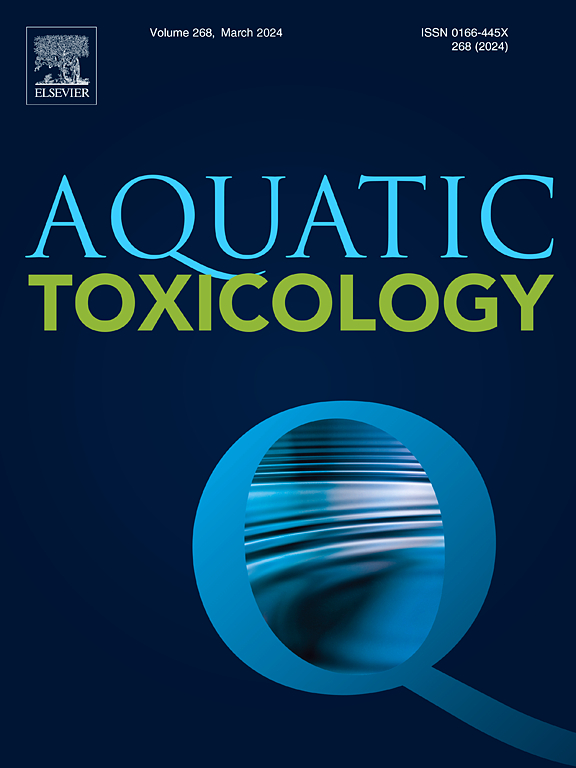From plankton to fish: The multifaceted threat of microplastics in freshwater environments
IF 4.1
2区 环境科学与生态学
Q1 MARINE & FRESHWATER BIOLOGY
引用次数: 0
Abstract
The detrimental impact of emerging pollutants, specifically microplastics (MPs), on the ecological environment are receiving increasing attention. Freshwater ecosystems serve as both repositories for terrestrial microplastic (MP) sources and conduits for their subsequent entry into marine environments. Consequently, it is imperative to rigorously investigate the toxicological effects of MPs on freshwater ecosystems. This article provides a comprehensive analysis of the ecological toxicity effects of MP pollution, both in isolation and in combination with other pollutants, on freshwater aquatic organisms, including plankton, benthic organisms, and fish. The review elucidates potential mechanisms underlying these effects, which encompass oxidative stress, metabolic disorders, immune and inflammatory responses, dysbiosis of the gut microbiota, DNA damage, and cell apoptosis. This paper advocates for the integrated application of multi-omics technologies to investigate the molecular mechanisms underlying the toxicity of MPs to freshwater aquatic organisms from interdisciplinary and multifaceted perspectives. Additionally, it emphasizes the importance of enhancing research on the compounded pollution effects arising from various pollution modes, particularly in conjunction with other pollutants. This study aims to establish a foundation for assessing the ecological risks posed by MPs in freshwater ecosystem and offers valuable insights for the protection of aquatic biodiversity and ecosystem stability.
从浮游生物到鱼类:淡水环境中微塑料的多方面威胁
新兴污染物特别是微塑料对生态环境的不利影响越来越受到人们的关注。淡水生态系统既是陆地微塑料(MP)来源的储存库,也是它们随后进入海洋环境的管道。因此,严格研究MPs对淡水生态系统的毒理学影响势在必行。本文全面分析了MP污染对淡水水生生物(包括浮游生物、底栖生物和鱼类)的生态毒性影响,包括单独污染和与其他污染物一起污染。这篇综述阐明了这些影响的潜在机制,包括氧化应激、代谢紊乱、免疫和炎症反应、肠道微生物群生态失调、DNA损伤和细胞凋亡。本文主张综合应用多组学技术,从跨学科、多角度研究多磺酸对淡水水生生物毒性的分子机制。此外,它强调必须加强对各种污染方式,特别是与其他污染物一起产生的复合污染效应的研究。本研究旨在为水生生物对淡水生态系统的生态风险评估奠定基础,为保护水生生物多样性和生态系统稳定性提供有价值的见解。
本文章由计算机程序翻译,如有差异,请以英文原文为准。
求助全文
约1分钟内获得全文
求助全文
来源期刊

Aquatic Toxicology
环境科学-毒理学
CiteScore
7.10
自引率
4.40%
发文量
250
审稿时长
56 days
期刊介绍:
Aquatic Toxicology publishes significant contributions that increase the understanding of the impact of harmful substances (including natural and synthetic chemicals) on aquatic organisms and ecosystems.
Aquatic Toxicology considers both laboratory and field studies with a focus on marine/ freshwater environments. We strive to attract high quality original scientific papers, critical reviews and expert opinion papers in the following areas: Effects of harmful substances on molecular, cellular, sub-organismal, organismal, population, community, and ecosystem level; Toxic Mechanisms; Genetic disturbances, transgenerational effects, behavioral and adaptive responses; Impacts of harmful substances on structure, function of and services provided by aquatic ecosystems; Mixture toxicity assessment; Statistical approaches to predict exposure to and hazards of contaminants
The journal also considers manuscripts in other areas, such as the development of innovative concepts, approaches, and methodologies, which promote the wider application of toxicological datasets to the protection of aquatic environments and inform ecological risk assessments and decision making by relevant authorities.
 求助内容:
求助内容: 应助结果提醒方式:
应助结果提醒方式:


